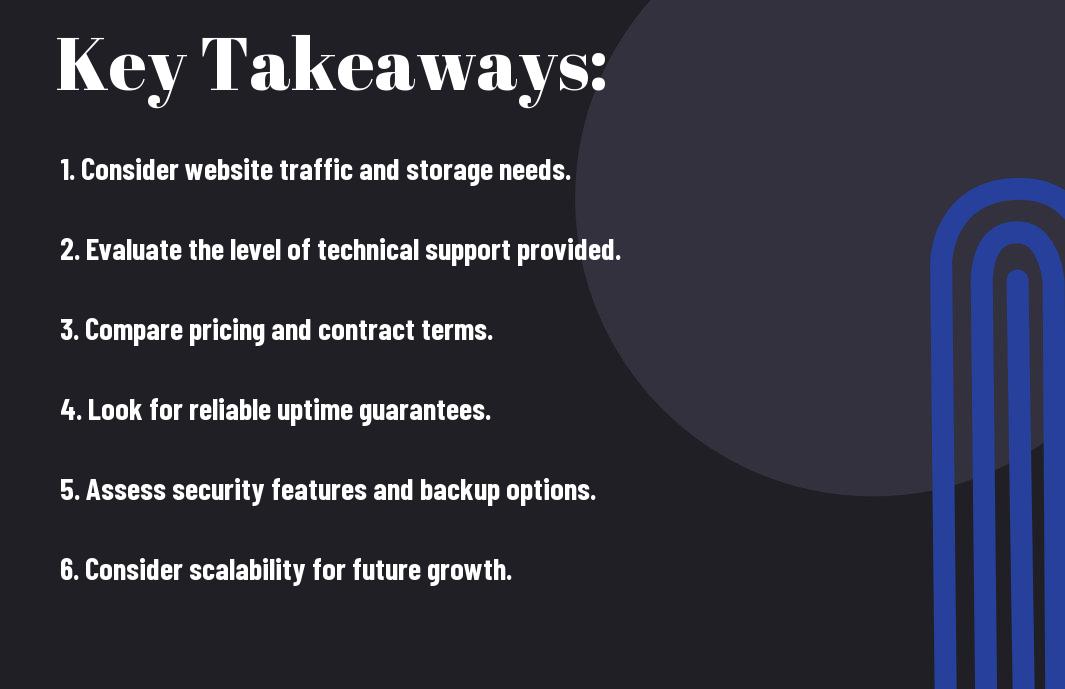Choosing the right hosting plan for your website can be a daunting task with the myriad of options available. It is crucial to carefully consider your website’s needs and requirements before making a decision. Factors such as reliability, security, speed, and scalability should be at the top of your priority list when evaluating different hosting plans. Additionally, understanding the various types of hosting such as shared, VPS, dedicated, and cloud hosting is imperative in making an informed choice. In this blog post, we will discuss the key factors to consider when choosing a hosting plan, as well as provide valuable tips to help you make the right decision for your website.
Key Takeaways:
- Understand your website’s needs: Assess the traffic, storage, and software requirements of your website to determine the hosting plan that best fits your needs.
- Consider scalability: Choose a hosting plan that allows for scalability as your website grows in size and traffic. This ensures that your website can handle increased demand without experiencing downtime or performance issues.
- Review hosting features and reliability: Look for hosting plans with reliable uptime, strong security features, and good customer support to ensure a seamless hosting experience for your website.

Analyzing Your Website Needs
One of the most important steps in choosing the right hosting plan for your website is to analyze your website needs. This involves assessing the specific requirements of your website in terms of traffic, resources, and performance. For a more in-depth guide on these considerations, check out The Ultimate Guide To Web Hosting.
Assessing Traffic Volume Predictions
When analyzing your website needs, it’s crucial to consider the volume of traffic you expect to receive. This includes both current traffic levels and potential future growth. Understanding your traffic volume predictions will help you determine the type of hosting plan that can support the level of activity on your site. If you anticipate a significant increase in traffic, you’ll need a hosting plan that can accommodate this growth without affecting your website’s performance.
Evaluating Required Resources and Performance
Evaluating the required resources and performance of your website is essential in choosing the right hosting plan. Consider factors such as the size of the website, its content, the number of concurrent visitors, and any special features or applications. You’ll need to ensure that your hosting plan provides the necessary resources, such as storage, bandwidth, and processing power, to support the performance demands of your website. Additionally, consider any specific performance requirements, such as fast loading times and secure transactions, and ensure that your hosting plan can meet these needs.

Types of Hosting Plans
Unlike your decision on the domain name, the hosting plan has several options to choose from. It’s essential to understand the different types of hosting plans available before making a decision. Each type has its advantages and limitations, so knowing the differences will help you make the right choice for your website. Recognizing the features and limitations of each hosting plan can save you time and money in the long run.
| Hosting Plan | Description |
|---|---|
| Shared Hosting | Multiple websites hosted on a single server, sharing resources |
| VPS Hosting | Virtual private server with dedicated resources and flexibility |
| Dedicated Hosting | Entire server dedicated to your website, offering full control |
| Cloud Hosting | Scalable and flexible hosting using cloud infrastructure |
Shared Hosting – Pros and Cons
Shared hosting is a cost-effective option for hosting your website. You can get started quickly and easily, but you may experience slower performance and limited resources due to sharing with other websites. Additionally, security risks are higher as you are sharing the server with other users. On the other hand, it’s suitable for small businesses and personal websites looking for an affordable hosting solution.
| Pros | Cons |
|---|---|
| Low cost | Performance may be affected by other websites on the server |
| Easy to set up | Security risks due to sharing server resources |
VPS Hosting – Features and Suitability
VPS hosting offers you dedicated resources and more flexibility. It’s suitable for websites that need more control and scalability. With VPS hosting, you can customize the server environment to meet your specific requirements. This type of hosting is ideal for growing businesses and websites experiencing high traffic.
Dedicated Hosting – Advantages and Limitations
Dedicated hosting provides you with an entire server for your website, offering unparalleled performance and control. You have the freedom to customize the server to meet your needs, but it comes with a higher cost. It’s suitable for large businesses and high-traffic websites that require maximum resources and performance.
Cloud Hosting – Scalability and Use Cases
Cloud hosting offers scalability and flexibility, allowing you to scale resources based on your website’s demand. It’s suitable for websites with fluctuating traffic and those that require high availability. With cloud hosting, you only pay for the resources you use, making it a cost-effective solution for growing websites.
Key Hosting Plan Features to Consider
After learning about the different types of hosting plans available, it’s important to understand the key features to consider when choosing the right plan for your website. For a detailed guide on this topic, you can refer to our tutorial on How to Choose Web Hosting Plan. Here are some essential factors you should keep in mind.
Storage and Bandwidth Limitations
When selecting a hosting plan, it’s crucial to consider the amount of storage and bandwidth offered. Your website’s performance and ability to handle traffic depend on these factors. Be mindful of the limitations imposed on these resources, as exceeding them can result in downtime and potential loss of visitors.
Security Measures and Reliability
Your website’s security is a critical aspect of choosing a hosting plan. Look for features such as SSL certificates, regular backups, and 24/7 monitoring to ensure the safety of your data. A reliable hosting provider should also guarantee optimal uptime to minimize any disruptions to your website’s availability.
Customer Support and Service Level Agreements
Strong customer support is essential when selecting a hosting plan. Look for a provider that offers 24/7 technical support and a robust service level agreement. This ensures that any issues you encounter will be promptly addressed, minimizing the impact on your website’s performance.
Upgrade Options and Costs
As your website grows, you may need to upgrade your hosting plan to accommodate increased traffic and resource needs. Before selecting a plan, consider the scalability and associated costs of upgrading. Ensure that the provider offers seamless upgrade options without disrupting your website’s operations.
Making the Decision
To ensure you’re selecting the right hosting plan for your website, it’s important to do your research. There are various factors to consider when making this decision, and it’s essential to weigh all your options carefully. You can find a comprehensive guide on how to choose the best web hosting plan for your website on How to Choose a Web Host: 5 Tips & Best Services.”
Comparing Providers and Plans
When comparing hosting providers and plans, it’s crucial to look at the features and services they offer. You should consider factors such as the amount of storage, bandwidth, uptime guarantees, and customer support options. By comparing this information in a table, you can easily see which provider offers the best value for your needs.
Reading Customer Reviews and Testimonials
One of the best ways to gain insight into the quality of a hosting provider is by reading customer reviews and testimonials. Pay attention to what other website owners are saying about their experiences with the company. This can give you a good idea of what to expect in terms of reliability, customer support, and overall satisfaction.
Conclusion
On the whole, choosing the right hosting plan for your website is a critical decision that will impact the performance and success of your online presence. By understanding the factors to consider, such as the type of website you have, your traffic needs, and your budget, you can make an informed choice that aligns with your specific requirements. It’s important to carefully evaluate the options available to you and to strike a balance between affordability and the features you need to support your website. Remember to also consider the level of customer support and reliability offered by the hosting provider. By doing so, you can ensure that your website is well-supported and equipped to meet your needs now and in the future.
FAQ
Q: What factors should I consider when choosing a hosting plan for my website?
A: When choosing a hosting plan for your website, consider factors such as the amount of traffic you expect, the type of website you have (e.g. blog, e-commerce, portfolio), and your budget. You should also consider the level of technical support and features offered by the hosting provider.
Q: What are the different types of hosting plans available for websites?
A: There are several types of hosting plans available, including shared hosting, VPS (Virtual Private Server) hosting, dedicated server hosting, and cloud hosting. Each type has its own advantages and disadvantages, so it’s important to choose the one that best fits your website’s needs.
Q: How can I determine the amount of bandwidth and storage I need for my website?
A: The amount of bandwidth and storage you need for your website depends on factors such as the size of your website, the number of visitors you expect, and the type of content you have (e.g. images, videos). You can estimate your bandwidth and storage needs by analyzing your current website traffic and content, and considering potential future growth.
Q: What level of technical support should I look for in a hosting plan?
A: When choosing a hosting plan, it’s important to consider the level of technical support offered by the hosting provider. Look for a provider that offers 24/7 customer support, preferably through multiple channels such as phone, email, and live chat. Additionally, consider the provider’s reputation for responsiveness and expertise in handling technical issues.
Q: What are some essential features to look for in a hosting plan?
A: Essential features to look for in a hosting plan include a reliable uptime guarantee, a user-friendly control panel, security features such as SSL certificates and malware scanning, and the ability to easily scale resources as your website grows. Additionally, consider any specific features that are important for your website, such as e-commerce support or database management tools.
CATEGORY:Web Hosting

